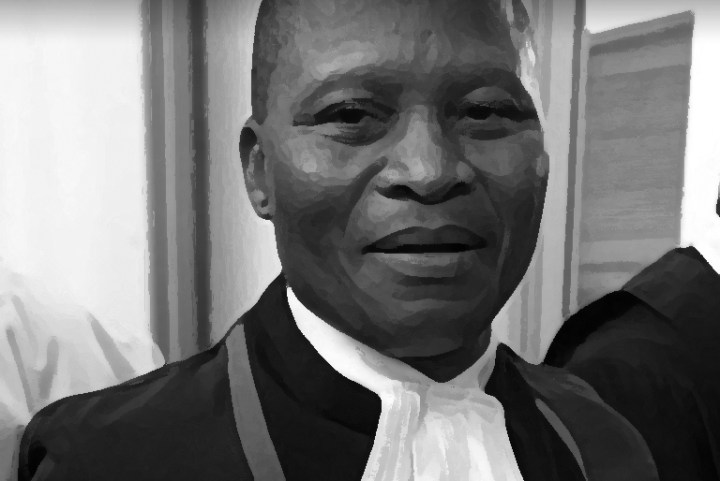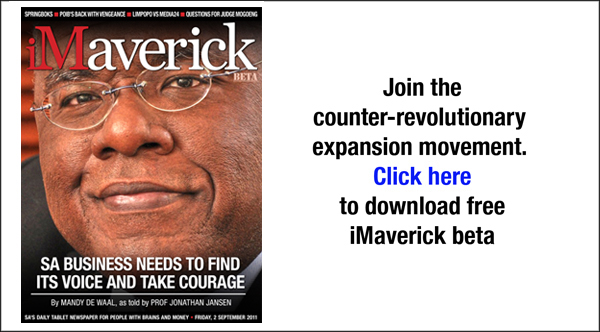Politics
Mogoeng: A ‘Divine Choice’ and other worrisomes

Watching someone for two days does not give you a complete picture of the person, their character, their sense of self, or even some of their more cherished beliefs; still, it can give you a good idea, especially about how they react when they are under pressure. You get a sense of what makes them get up in the morning, of where they will take the country if they get to be in charge of the one of crucial branches of the state. We failed to be impressed. By STEPHEN GROOTES.
Judge Mogoeng Mogoeng is not an urban sophisticate. That’s not necessarily a bad thing. But it is something we should know about him. He also has a thin skin. During the two-day meeting of the Judicial Service Commission in Cape Town this weekend, he made damn sure everyone knew that he had been “unfairly… criticised in an unprecedented fashion”. He used the world “unprecedented” a lot, in fact, all the time. As though something, if new, must be bad or wrong. That may not be an entirely unfair way to characterise him, though: he’s not someone who likes change. Or criticism. Mogoeng spoke about his ruling in the McBride Case in which he said “dignity is as important as freedom of expression”. He pointed out that he was reminded of this when he saw some “of the cartoons and reports about me recently”.
Oh please. Welcome to the big time. That’s what public life in this country entails. It’s a vibrant place. You need sharp elbows. Grow up.
Just before the hearing started there was a small protest by a group of HIV campaigners (not sure how else to refer to them, as they were wearing purple HIV T-shirts and singing songs about sexism). I can’t help but think there might have been a more constructive, and perhaps more appropriate, way of protesting.
That might have really given us an answer to the question that hung over this entire hearing. Is Mogoeng homophobic in the sense that he is scared of gay people? Is he anti-gay, in that homosexuality is a disease, something that, God forbid, could even be contagious? Or is he just forgetful when it comes to writing dissenting judgments, like the one in Le Roux vs Dey that involved images of gay sex? We didn’t get a complete answer.
The Judicial Service Commission did several dances around this question. But in the end it went down to that usual tango of “This is what I believe” followed by the chorus “We don’t believe you”. You know, like in Parliament.
Then we have Mogoeng the man from the small town. He spoke movingly about his escape from poverty, the life his mother endured. The size of Mafikeng (where he served at Judge President of the North West for seven years) was shown in a final set of questions by the IFP’s Koos van der Merwe. Mogoeng admitted the entire division has just six judges, and around 30 advocates. Van der Merwe pointed out that the North Gauteng High Court alone has 30 judges.
What this means is that Mogoeng is used to being a massive fish in a small pond. He’s now moving up in the world, but he hasn’t necessarily had time to learn all the lessons that one should in that process. I must admit to a certain urban bias to this. And yet, Mogoeng is probably far more resonant to the people of South Africa than I am. But I do expect lawyers and judges to be the most sophisticated people there are. In short, I expect their punchlines to be in Latin. That’s not the case here. Perhaps there is a strong case for saying that’s how it should be, that Mogoeng is actually what we need.
I’m not convinced of that, however. Most of the lawyers and judges he’ll deal with will come from oceans, not puddles. He needs to manage them well. He also needs to know that in a bigger pond, people bump up against each other; there is not the same amount of space, it’s crowded. He should swim carefully. An abrasive style is not a good thing.
And an abrasive style he has. You could hear a pin drop when he told the Deputy Chief Justice: “You don’t have to be sarcastic, Sir.” It was the mark of a man who’s lost his temper. And that was relatively early in the proceedings. It wasn’t the losing of a temper in a volcanic, Julius Malema style, but it was very un-judicial. It should never have happened. He apologised, several times. But the damage was done. Losing one’s temper in public in front of microphones and cameras is a mistake that can never be undone. It has been, and it will be, replayed endlessly. And it does show a certain temperament.
Mogoeng is nothing if not confident. He’s a short man, but there’s a slight swagger to him. It’s the confidence that may come from walking with God behind you. One of the more telling moments came when Van der Merwe (who really has a gift for this sort of thing) asked Mogoeng if it was true that he had told a colleague (sadly unnamed) that he believed “God wanted you to be Chief Justice”? It really was an amazing question and an astonishing thing to say.
The problem that a religious person faces when asked such a question, is that they are bound to tell the truth. And they want to tell the truth. That’s what their faith demands of them. It’s also because they are proud of it, it’s what defines them. And it certainly defines Mogoeng.
“I want you to know,” he said, “I am one of those people who believes there is a God, and God does speak, so when a position such as this one comes up, knowing my limitations… without God’s strength I will fail, and fail dismally. I prayed, and I got a signal that it was the right thing to do.”
“So God wants you to be Chief Justice?” followed up van der Merwe.
“I think so”, came the reply.
The nature of that signal wasn’t exactly clear. But this is really the nub of the problem. It’s not that someone has beliefs that is an issue. As Mogoeng has rightly pointed out, there are judges all over the world who are religious. Muslim candidates for a judgeship at the JSC could probably expect to face the question about what comes first, God, or the law. The issue is the brand of religion. Are you a Christian or a Klu Klux Klanner? A Muslim or a member of al-Qaeda? One man’s religion is another man’s poison, one woman’s Pius (I was wondering how long it would take you to use that word in a story about chief justices – Ed.) is another woman’s freakily happy-clappy. Mogoeng said many times that the law comes first, the Constitution comes first.
But religion, and God, seem to be such a big part of his life that it’s hard to take him purely at face value. In short, his particular brand of religion would seem to demand that he, in fact, place it before his duty to “uphold the law and the Constitution”.
In the final analysis, it was never going to matter. The JSC was always going to confirm Mogoeng. So what kind of chief justice will he make?
His real power is not going to come on the Constitutional Court. He’s likely to continue to be very quiet on the bench. His real power is going to be chairing meetings of the JSC. Moseneke used his powers as JSC chair with great effect, nudging, pushing, making sure questions were asked, and, more crucially, answered. Mogoeng is someone for whom “respect” is very important. That doesn’t augur well for those who enjoy a good rough cross-examination in their hearings. It would appear to mean that candidates will be more protected than they have been. And this will extend to those judges who are brought up on disciplinary issues.
Mogoeng is also likely to have a higher profile than previous chief justices. He likes the limelight. In a way, and this is an unfair comparison to both of them, he’s going to be a little like Tito Mboweni on speed. Hugely important, but often saying things he shouldn’t. It will be rather entertaining, but possibly rather damaging all round. The flip side, and this could happen, is that Mogoeng may turn out to be independent. He has all the signs of not enjoying being pushed around. And at some point the politics may push him one way, but his higher master may push the other. Maybe this could backfire on Zuma after all. DM
Grootes is an EWN reporter.




 Become an Insider
Become an Insider